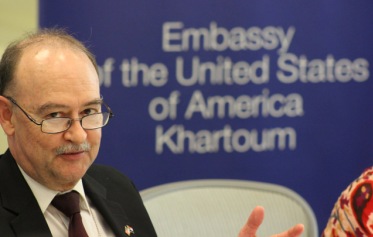US consults with Sudan and rebels to bring peace in Darfur
April 21, 2013 (KHARTOUM) – Washington is in contact with the Sudanese government, Darfur rebels and the joint mediation to find a common ground in order to promote peaceful settlement of Darfur conflict, US Ambassador in Khartoum disclosed on Sunday.

The announcement comes days before the start of direct talks to end South Kordofan and Blue Nile conflict under the auspices of the African Union mediation between the Sudanese government and the Sudan People’s Liberation Movement-North (SPLM-N).
The diplomat underlined that US administration is supportive to the Doha Document for Peace in Darfur (DDPD), a framework text signed by the Sudanese government and the Liberation and Justice Movement (LJM) on 14 July 2011 and the Justice and Equality Movement – Mohamed Bashar (JEM Bashar) on 6 April 2013.
Stafford further said that his government cannot impose a strategy for peace in Sudan without the willingness of the Government and the people of Sudan, stressing that Washington respects what Sudanese decide to reach a final peace agreement.
Sudanese officials used to accuse the American administration of supporting rebel groups and their New Down Charter aiming to topple Bashir’s régime. On the other hand, rebels were disappointed by the position of the former US envoy Princeton Lyman who publicly resisted pressure groups which sought to influence the White House to support them.
The Chargé d’affaires said that Washington is committed to continue dialogue with the Sudanese government in spite of the challenges facing bilateral relationship.
He added that a new special envoy for Sudan and South Sudan will be soon appointed.
Sudan has been under the U.S. blacklist of states sponsoring terrorism since 1993 on allegations of harboring Islamist militants despite credible reports of Sudan being a cooperative intelligence partner of Washington in the “war on terror”.
Sudan is also subject to comprehensive economic sanctions since 1997 over terrorism charges as well as human right abuses. Further sanctions, particularly on weapons, have been imposed since the 2003 outbreak of violence in the western Darfur region.
They also express disappointment at what they describe the US failure to keep its promises to improve ties with Khartoum after the latter signed the US-brokered Comprehensive Peace Agreement (CPA) with South Sudan in 2005 and later recognized its independence under the deal.
The American Administration on the other hand demands that Khartoum settles the outstanding issues with the South Sudan, reaches a deal with the SPLM-N rebels in Blue Nile and South Kordofan and fully implements the DDPD in order to bring peace in western Sudan.
(ST)
